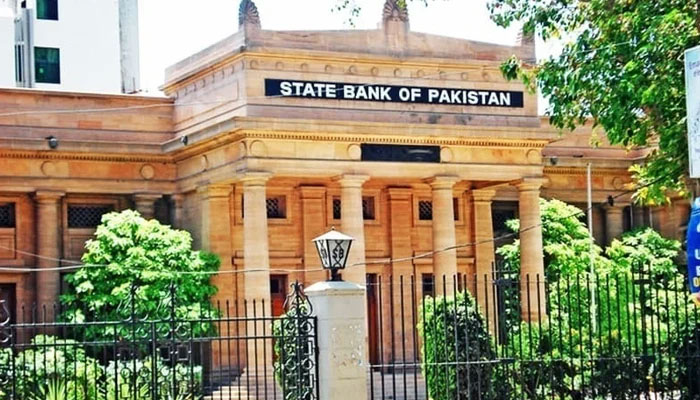SBP withdraws restrictions: Banks no more require permission before import transactions
The SBP announced that it would no longer require banks to obtain prior authorisation before initiating some import transactions
KARACHI: The State Bank of Pakistan (SBP) on Tuesday announced that it would no longer require banks to obtain prior authorisation before initiating some import transactions.
Additionally, the SBP has asked the banks to prioritise and facilitate imports of essential items, energy, agricultural inputs, imports from industries with a focus on exports, and imports with deferred payment.
Analysts said the SBP’s latest move won’t make any material change as the situation of dollar availability is still the same. It would be a mere transition from formal restriction to informal restriction. The foreign reserves held by the central bank have fallen to $6.1 billion as of December 16. The reserves are enough to cover only five weeks of imports.
“The SBP has eliminated this restriction, but it has also made sure that the authorised dealer or bank will give priority to imports of goods related to food, energy and exports,” said Tahir Abbas, the head of research at Arif Habib Limited. “Before beginning import deals, banks would also check the market’s position for dollar liquidity. As a result, we anticipate that the system will remain unchanged from where it is right now,” Tahir added.
“To finance a higher current account deficit, we lack the foreign reserves. Global trade organisations like the World Trade Organisation, which oppose import bans and support free trade principles, are the rationale for lifting such restrictions,” he said.
To conserve eroding foreign exchange reserves and ease pressure on the currency, the SBP imposed some restrictions on imports in May and July of this year and instructed the banks to request authorisation in advance from the Foreign Exchange Operations Department, SBP Banking Services Corporation (BSC), before beginning transactions for the import of a number of goods related to HS Code Chapters 84, 85, and some items of Chapter 87. These chapters include electric power generation equipment, electrical equipment, mobile phones (CKD) and automobiles (CKD). “It has now been decided to withdraw the above instructions with effect from January 2, 2023. Consequently, requests for import transactions already submitted to SBP-BSC pertaining to above referred HS Codes stand returned to the authorised dealers [banks] for appropriate disposal at their end,” the SBP said in a circular.
Imports related to food (wheat, edible oil, etc.) and pharmaceutical (raw materials, life-saving/critical medicines, surgical instruments including stents, etc.) are considered to be essential, according to the SBP. Energy imports comprising the petroleum group (oil and gas) and coal (for power projects based upon merit order of Ministry of Energy), it added. Seed, fertiliser, and pesticide imports are needed as agricultural inputs. “ADs may actively engage with all their customers to process their requests, keeping in view the customers’ risk profile and liquidity conditions prevailing in the foreign exchange market,” the SBP said.
Pakistan’s leading automakers stopped production due to a shortage of raw materials. Import limitations hurt the clearance of import shipments, which influenced the inventories of automakers.
-
 Detective Chief Inspector Reveals How Andrew Got Treated In Police Custody
Detective Chief Inspector Reveals How Andrew Got Treated In Police Custody -
 Gemini 3.1 Pro Unveiled: Google’s Next-gen AI For Advanced Reasoning & Faster Enterprise Workflows
Gemini 3.1 Pro Unveiled: Google’s Next-gen AI For Advanced Reasoning & Faster Enterprise Workflows -
 Oprah Winfrey Talks About Weight-loss 'tool To Manage' Health
Oprah Winfrey Talks About Weight-loss 'tool To Manage' Health -
 Texas Emerges As World's Future Data Center Capital
Texas Emerges As World's Future Data Center Capital -
 South Korea’s Ex-President Yoon Issues Public Apology After Being Sentenced To Life Over Martial Law
South Korea’s Ex-President Yoon Issues Public Apology After Being Sentenced To Life Over Martial Law -
 Eric Dane Recorded Episodes For The Third Season Of 'Euphoria' Before His Death From ALS Complications
Eric Dane Recorded Episodes For The Third Season Of 'Euphoria' Before His Death From ALS Complications -
 Inside Morning Of Andrew’s Arrest And How He Responded: ‘Do You Know Who I Am?’
Inside Morning Of Andrew’s Arrest And How He Responded: ‘Do You Know Who I Am?’ -
 OpenAI Sam Altman Predicts AI Superintelligence By 2028: Is Humanity Ready For A Turning Point?
OpenAI Sam Altman Predicts AI Superintelligence By 2028: Is Humanity Ready For A Turning Point? -
 WhatsApp Rolls Out Group Message History To Ease Group Chats
WhatsApp Rolls Out Group Message History To Ease Group Chats -
 Tesla Expands Cybertruck Lineup With Affordable Model In US, Slashes Cyberbeast Price To Boost Demand
Tesla Expands Cybertruck Lineup With Affordable Model In US, Slashes Cyberbeast Price To Boost Demand -
 AI Is Not As Powerful As We Think, Says Mathematician Hannah Fry
AI Is Not As Powerful As We Think, Says Mathematician Hannah Fry -
 How Andrew's Feeling Since His Arrest & Subsequent Release Amid Tech & Computers Seize
How Andrew's Feeling Since His Arrest & Subsequent Release Amid Tech & Computers Seize -
 Trump Officially Directs US Agencies To Identify And Release Files On Extraterrestrial Life
Trump Officially Directs US Agencies To Identify And Release Files On Extraterrestrial Life -
 2026 Winter Olympics: Alysa Liu Claims Gold, Snapping 20-year Drought For US Figure Skating
2026 Winter Olympics: Alysa Liu Claims Gold, Snapping 20-year Drought For US Figure Skating -
 Hilary Duff Opens Up About Marriage Fears Despite Strong Bond With Matthew Koma
Hilary Duff Opens Up About Marriage Fears Despite Strong Bond With Matthew Koma -
 ‘Grey’s Anatomy’ Star Eric Dane Breathes His Last At 53
‘Grey’s Anatomy’ Star Eric Dane Breathes His Last At 53




